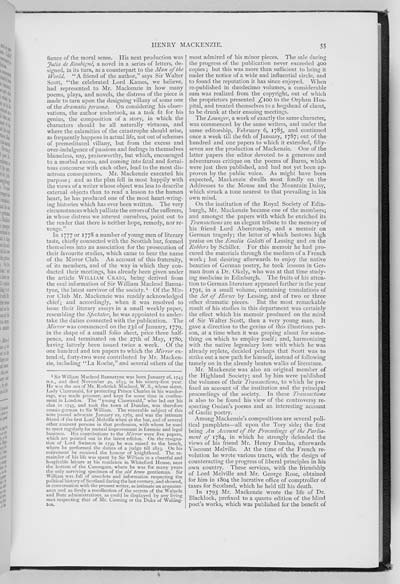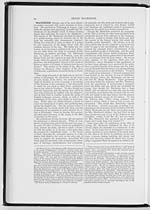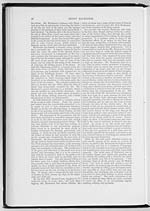55
fiance of the moral sense. His next production was
Julia de Roubign�, a novel in a series of letters, de-
signed, in its turn, as a counterpart to the Man of the
World. "A friend of the author," says Sir Walter
Scott, "the celebrated Lord Kames, we believe,
had represented to Mr. Mackenzie in how many
poems, plays, and novels, the distress of the piece is
made to turn upon the designing villany of some one
of the dramatis persona. On considering his obser-
vations, the author undertook, as a task fit for his
genius, the composition of a story, in which the
characters should be all naturally virtuous, and
where the calamities of the catastrophe should arise,
as frequently happens in actual life, not out of schemes
of premeditated villany, but from the excess and
over-indulgence of passions and feelings in themselves
blameless, nay, praiseworthy, but which, encouraged
to a morbid excess, and coming into fatal and fortui-
tous concourse with each other, lead to the most dis-
astrous consequences. Mr. Mackenzie executed his
purpose; and as the plan fell in most happily with
the views of a writer whose object was less to describe
external objects than to read a lesson to the human
heart, he has produced one of the most heart-wring-
ing histories which has ever been written. The very
circumstances which palliate the errors of the sufferers,
in whose distress we interest ourselves, point out to
the reader that there is neither hope, remedy, nor re-
venge."
In 1777 or 1778 a number of young men of literary
taste, chiefly connected with the Scottish bar, formed
themselves into an association for the prosecution of
their favourite studies, which came to bear the name
of the Mirror Club. An account of this fraternity,
of its members, and of the way in which they con-
ducted their meetings, has already been given under
the article WILLIAM CRAIG, being derived from
the oral information of Sir William Macleod Banna-
tyne, the latest survivor of the society.1 Of the Mir-
ror Club Mr. Mackenzie was readily acknowledged
chief; and accordingly, when it was resolved to
issue their literary essays in a small weekly paper,
resembling the Spectator, he was appointed to under-
take the duties connected with the publication. The
Mirror was commenced on the 23d of January, 1779,
in the shape of a small folio sheet, price three half-
pence, and terminated on the 27th of May, 1780,
having latterly been issued twice a week. Of the
one hundred and ten papers to which the Mirror ex-
tended, forty-two were contributed by Mr. Macken-
zie, including "La Roche, "and several others of the
1 Sir William Macleod Bannatyne was born January 26, 1743
O.S., and died November 30, 1833, in his ninety-first year.
He was the son of Mr. Roderick Macleod, W. S., whose sister,
Lady Clanranald, for protecting Prince Charles in his wander-
ings, was made prisoner, and kept for some time in confine-
ment in London. The "young Clanranald," who led out his
clan in 1745, and took the town of Dundee, was therefore
cousin-german to Sir William. The venerable subject of this
note passed advocate January 22, 1765, and was the intimate
friend of the first Lord Melville when at the bar, and of several
other eminent persons in that profession, with whom he used
to meet regularly for mutual improvement in forensic and legal
business. His contributions to the Mirror were five papers,
which are pointed out in the latest edition. On the resigna-
tion of Lord Swinton in 1799 he was raised to the bench,
where he performed the duties of a judge till 1823. On his
retirement he received the honour of knighthood. The re-
mainder of his life was spent by Sir William in a cheerful and
hospitable leisure at his residence in Whiteford House, near
the bottom of the Canongate, where he was for many years
the only surviving specimen of the old town gentleman. Sir
William was full of anecdote and information respecting the
political history of Scotland during the last century, and showed,
in conversation with the present writer, as intimate an acquaint-
ance and as lively a recollection of the secrets of the Walpole
and Bute administrations, as could be displayed by any living
man respecting that of Mr. Canning or the Duke of Welling-
ton.
most admired of his minor pieces. The sale during
the progress of the publication never exceeded 400
copies; but this was more than sufficient to bring it
under the notice of a wide and influential circle, and
to found the reputation it has since enjoyed. When
re-published in duodecimo volumes, a considerable
sum was realized from the copyright, out of which
the proprietors presented �100 to the Orphan Hos-
pital, and treated themselves to a hogshead of claret,
to be drunk at their ensuing meetings.
The Lounger, a work of exactly the same character,
was commenced by the same writers, and under the
same editorship, February 6, 1785, and continued
once a week till the 6th of January, 1787; out of the
hundred and one papers to which it extended, fifty-
seven are the production of Mackenzie. One of the
latter papers the editor devoted to a generous and
adventurous critique on the poems of Burns, which
were just then published, and had not yet been ap-
proven by the public voice. As might have been
expected, Mackenzie dwells most fondly on the
Addresses to the Mouse and the Mountain Daisy,
which struck a tone nearest to that prevailing in his
own mind.
On the institution of the Royal Society of Edin-
burgh, Mr. Mackenzie became one of the members;
and amongst the papers with which he enriched its
Transactions are an elegant tribute to the memory of
his friend Lord Abercromby, and a memoir on
German tragedy; the latter of which bestows high
praise on the Emelia Galotti of Lessing and on the
Robbers by Schiller. For this memoir he had pro-
cured the materials through the medium of a French
work; but desiring afterwards to enjoy the native
beauties of German poetry, he took lessons in Ger-
man from a Dr. Okely, who was at that time study-
ing medicine in Edinburgh. The fruits of his atten-
tion to German literature appeared further in the year
1791, in a small volume, containing translations of
the Set of Horses by Lessing, and of two or three
other dramatic pieces. But the most remarkable
result of his studies in this department was certainly
the effect which his memoir produced on the mind
of Sir Walter Scott, then a very young man. It
gave a direction to the genius of this illustrious per-
son, at a time when it was groping about for some-
thing on which to employ itself; and, harmonizing
with the native legendary lore with which he was
already replete, decided perhaps that Scott was to
strike out a new path for himself, instead of following
tamely on in the already beaten walks of literature.
Mr. Mackenzie was also an original member of
the Highland Society; and by him were published
the volumes of their Transactions, to which he pre-
fixed an account of the institution and the principal
proceedings of the society. In these Transactions
is also to be found his view of the controversy re-
specting Ossian's poems and an interesting account
of Gaelic poetry.
Among Mackenzie's compositions are several poli-
tical pamphlets�all upon the Tory side; the first
being An Account of the Proceedings of the Parlia-
ment of 1784, in which he strongly defended the
views of his friend Mr. Henry Dundas, afterwards
Viscount Melville. At the time of the French re-
volution he wrote various tracts, with the design of
counteracting the progress of liberal principles in his
own country. These services, with the friendship
of Lord Melville and Mr. George Rose, obtained
for him in 1804 the lucrative office of comptroller of
taxes for Scotland, which he held till his death.
In 1793 Mr. Mackenzie wrote the life of Dr.
Blacklock, prefixed to a quarto edition of the blind
poet's works, which was published for the benefit of

![]() Universal Viewer |
Universal Viewer | ![]() Mirador |
Large image | Transcription
Mirador |
Large image | Transcription
![]()

